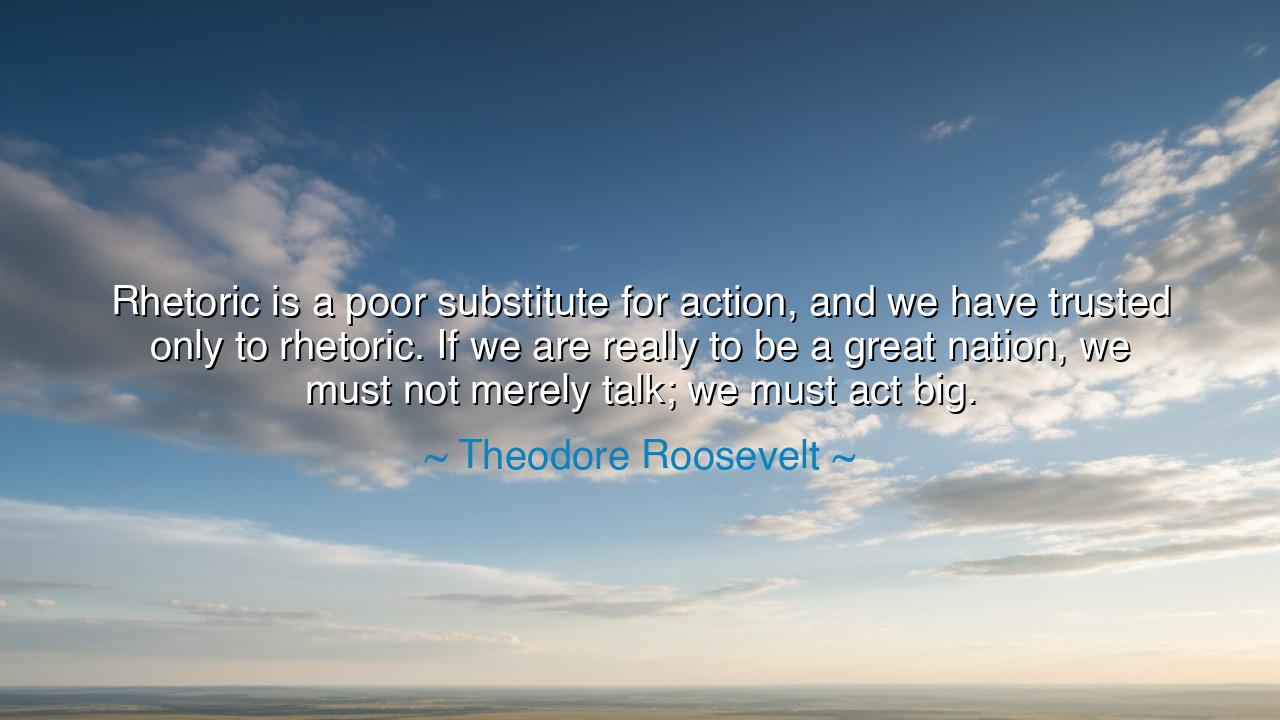
Rhetoric is a poor substitute for action, and we have trusted
Rhetoric is a poor substitute for action, and we have trusted only to rhetoric. If we are really to be a great nation, we must not merely talk; we must act big.






“Rhetoric is a poor substitute for action, and we have trusted only to rhetoric. If we are really to be a great nation, we must not merely talk; we must act big.” Thus spoke Theodore Roosevelt, the lion-hearted statesman, the warrior-scholar, the man who believed that greatness is not proclaimed but proven. In these words he delivered a timeless challenge — to his country, and to all who dream of greatness. For Roosevelt, words, no matter how stirring, are but wind unless they lead to deeds; speeches fade, but actions endure. His was a creed of motion, of effort, of daring; a call to live not in talk, but in triumph.
Roosevelt’s words were born in the fiery crucible of the early twentieth century, when America was rising upon the world stage. The nation had wealth, ambition, and vision — yet Roosevelt saw a danger: the temptation to rest in prideful speech instead of laborious doing. To him, rhetoric without action was the disease of decaying empires, the empty boast of nations that had forgotten toil. He warned that if America wished to be great, she must act great — she must build, explore, reform, and defend. It was not enough to declare ideals; they must be lived, embodied in the work of human hands and the courage of human hearts.
Roosevelt himself was a living example of this philosophy. Frail in childhood, he forged himself into strength through will and discipline. He climbed mountains, hunted on distant continents, and charged up the slopes of San Juan Hill with bullets whistling around him. Later, as president, he tamed the trusts, built the Panama Canal, and preserved vast stretches of wilderness for generations unborn. He did not wait for history to move; he moved history. His life was proof that action is the measure of conviction. To Roosevelt, talk of virtue meant nothing unless it was turned into effort, sweat, and sacrifice.
In his era, the power of rhetoric was immense — newspapers thundered, politicians proclaimed, and orators stirred crowds with promises of progress. Yet Roosevelt saw that speech alone cannot build bridges, cannot feed the hungry, cannot defend liberty. He admired eloquence, but only when it served the cause of deeds. He believed that every nation, like every man, must test its words by its works. The danger of too much talk is that it breeds complacency — it lets one feel noble without doing the noble thing. “We have trusted only to rhetoric,” he said, lamenting how easily words can lull a people into inaction.
History itself bears witness to his truth. Consider the fate of the Roman Empire, which once ruled the world through its might and virtue. As the centuries passed, the Romans ceased to act; they debated, boasted, and feasted upon their former glory while their enemies gathered strength at their borders. Their empire rotted not from invasion, but from inaction. Words filled the Senate halls where courage once had stood. And so Rome fell — not with the cry of battle, but with the murmur of speeches. Roosevelt’s warning echoes the same law: that rhetoric without action is the herald of decline.
Yet Roosevelt did not despise words; he understood their power when joined to will. He himself was a master of speech, his voice booming like thunder in the halls of Congress. But to him, speech was the spark, not the flame — a call to awaken courage, not to replace it. The difference between empty rhetoric and living rhetoric is deed. The true orator, like the true leader, moves men not merely to applaud, but to act. “We must act big,” he said — meaning that a nation’s actions must match the grandeur of its ideals. To dream greatly is noble; to do greatly is divine.
O children of the future, take this teaching to heart. Let not your generation be known for its noise, but for its nobility. Speak, yes — speak of justice, of progress, of peace — but then rise from your words and make them real. Build what you imagine. Defend what you value. Reform what you condemn. Let no speech leave your lips that your hands will not honor. For as Roosevelt knew, a life of talk is vapor, but a life of action carves its name upon eternity.
Therefore, remember this: talk less, do more; promise less, accomplish more; dream boldly, but act boldly too. For nations and men alike are judged not by what they say, but by what they achieve. The words of Theodore Roosevelt still ring like a trumpet across time: “We must not merely talk; we must act big.” Let this be your creed — that your speech be the herald of your action, and your action the monument of your soul. For only those who act greatly can ever hope to be truly great.






AAdministratorAdministrator
Welcome, honored guests. Please leave a comment, we will respond soon